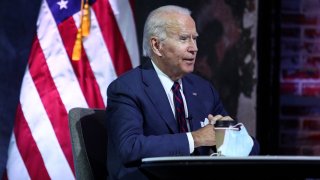
- President-elect Joe Biden received a briefing Tuesday on national security and diplomacy from a dozen experts outside of government.
- President Donald Trump is still barring Biden from receiving the classified intelligence and threat briefings that are typically given to presidents-elect.
- Biden is widely viewed as a reliable, informed leader on national security issues who will prioritize alliance-building and maintaining a U.S. troop presence around the world.
WASHINGTON — President-elect Joe Biden received a briefing Tuesday on national security and diplomacy from a dozen experts outside of government, highlighting the fact that President Donald Trump is still barring Biden from receiving the classified intelligence and threat briefings that are typically given to presidents-elect.
"You know that I've been unable to get the briefing that ordinarily would have come by now," Biden said to the virtually assembled group at the outset of the meeting. "So I just want to get your input on what you see ahead."
Participants in the briefing included many familiar figures from the Obama-Biden national security firmament. Among them were former deputy national security advisor Tony Blinken, former CIA deputy director Avril Haines, former U.S. Ambassador to the United Nations Samantha Power, former Special Operations commander Adm. William McRaven and former CENTCOM commander Gen. Lloyd Austin.
Also present was retired Army Gen. Stanley McChrystal, who in 2009 resigned his post as commander of U.S. forces in Afghanistan after he was quoted in a Rolling Stone article insulting then-Vice President Biden.
Tuesday's briefing was closed to the press. A Biden transition team statement following the meeting said experts briefed Biden and Vice President-elect Kamala Harris "on the diplomatic, defense, and intelligence challenges the administration will inherit on day one, focusing on both the strategic landscape as well as the readiness of our foreign policy and national security departments and agencies."
Money Report
The statement also said members of the transition team will continue to meet with experts outside of government, "especially as the lack of GSA ascertainment prevents the transition from meeting with and hearing from current Executive Branch officials, including on pressing matters of national security and foreign policy."
As Trump's refusal to admit he lost the presidential race stretches into its second week, the decision by the top official at the General Services Administration, Emily Murphy, to withhold the letter required to begin formal transition activities has become increasingly controversial.
While Trump attempts to overturn the election results with a series of last-ditch legal maneuvers, several top Republicans have said that denying Biden the classified intelligence briefings he needs to prepare his national security team are a step too far.
"Our adversaries aren't going to wait for [Biden] to catch up to take action," said Sen. Marco Rubio, R-Fla., the acting chair of the Senate Intelligence Committee. "Giving [Biden] access to additional information doesn't prejudice the president's electoral claims."
Granting Biden access to classified briefings "needs to occur so that regardless of the outcome of the election, whichever way that it goes, people can be ready for that actual task," said Sen. James Lankford, R-Okla., in a radio interview last week.
Yet neither Rubio nor Lankford, nor any of their Republican colleagues, appears willing to actually pressure the administration to begin the formal transition process.
Biden is widely viewed as a reliable, informed leader when it comes to national security issues, having served as both vice president and as chairman of the Senate Foreign Relations Committee. He is also seen as someone who will prioritize alliance-building and maintaining a U.S. troop presence around the world over the isolationism and troop withdrawals that undergird Trump's national security vision.
With just weeks to go before Trump leaves office, the Pentagon announced Tuesday that he had ordered a further removal of U.S. forces from Afghanistan, a decision that drew immediate criticism from top Republicans and a broad coalition of national security experts.






